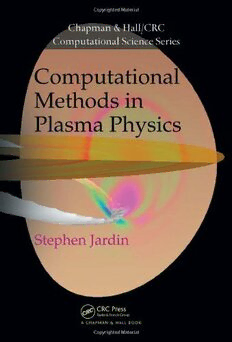Download Computational Methods in Plasma Physics (Chapman & Hall CRC Computational Science) PDF Free - Full Version
Download Computational Methods in Plasma Physics (Chapman & Hall CRC Computational Science) by Stephen Jardin in PDF format completely FREE. No registration required, no payment needed. Get instant access to this valuable resource on PDFdrive.to!
About Computational Methods in Plasma Physics (Chapman & Hall CRC Computational Science)
Assuming no prior knowledge of plasma physics or numerical methods, Computational Methods in Plasma Physics covers the computational mathematics and techniques needed to simulate magnetically confined plasmas in modern magnetic fusion experiments and future magnetic fusion reactors. Largely self-contained, the text presents the basic concepts necessary for the numerical solution of partial differential equations. Along with discussing numerical stability and accuracy, the author explores many of the algorithms used today in enough depth so that readers can analyze their stability, efficiency, and scaling properties. He focuses on mathematical models where the plasma is treated as a conducting fluid, since this is the most mature plasma model and most applicable to experiments. The book also emphasizes toroidal confinement geometries, particularly the tokamak—a very successful configuration for confining a high-temperature plasma. Many of the basic numerical techniques presented are also appropriate for equations encountered in a higher-dimensional phase space. One of the most challenging research areas in modern science is to develop suitable algorithms that lead to stable and accurate solutions that can span relevant time and space scales. This book provides an excellent working knowledge of the algorithms used by the plasma physics community, helping readers on their way to more advanced study.
Detailed Information
| Author: | Stephen Jardin |
|---|---|
| Publication Year: | 2010 |
| ISBN: | 9781439810217 |
| Pages: | 364 |
| Language: | English |
| File Size: | 2.908 |
| Format: | |
| Price: | FREE |
Safe & Secure Download - No registration required
Why Choose PDFdrive for Your Free Computational Methods in Plasma Physics (Chapman & Hall CRC Computational Science) Download?
- 100% Free: No hidden fees or subscriptions required for one book every day.
- No Registration: Immediate access is available without creating accounts for one book every day.
- Safe and Secure: Clean downloads without malware or viruses
- Multiple Formats: PDF, MOBI, Mpub,... optimized for all devices
- Educational Resource: Supporting knowledge sharing and learning
Frequently Asked Questions
Is it really free to download Computational Methods in Plasma Physics (Chapman & Hall CRC Computational Science) PDF?
Yes, on https://PDFdrive.to you can download Computational Methods in Plasma Physics (Chapman & Hall CRC Computational Science) by Stephen Jardin completely free. We don't require any payment, subscription, or registration to access this PDF file. For 3 books every day.
How can I read Computational Methods in Plasma Physics (Chapman & Hall CRC Computational Science) on my mobile device?
After downloading Computational Methods in Plasma Physics (Chapman & Hall CRC Computational Science) PDF, you can open it with any PDF reader app on your phone or tablet. We recommend using Adobe Acrobat Reader, Apple Books, or Google Play Books for the best reading experience.
Is this the full version of Computational Methods in Plasma Physics (Chapman & Hall CRC Computational Science)?
Yes, this is the complete PDF version of Computational Methods in Plasma Physics (Chapman & Hall CRC Computational Science) by Stephen Jardin. You will be able to read the entire content as in the printed version without missing any pages.
Is it legal to download Computational Methods in Plasma Physics (Chapman & Hall CRC Computational Science) PDF for free?
https://PDFdrive.to provides links to free educational resources available online. We do not store any files on our servers. Please be aware of copyright laws in your country before downloading.
The materials shared are intended for research, educational, and personal use in accordance with fair use principles.

